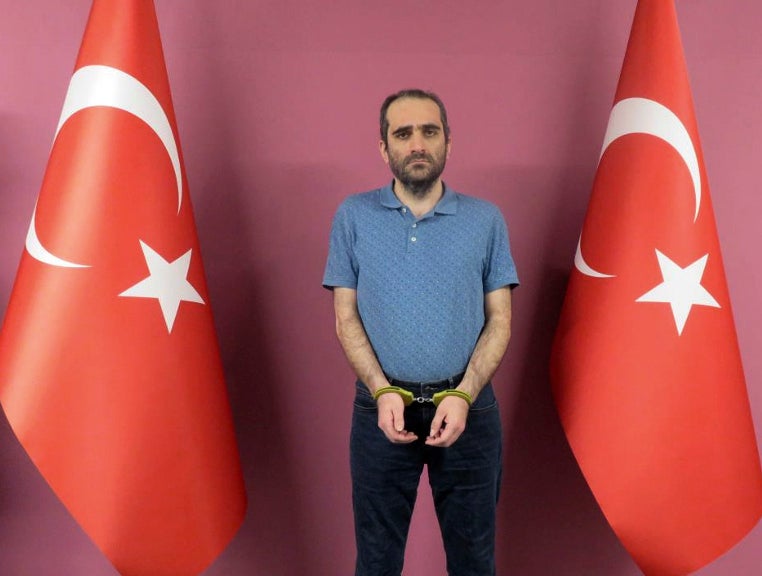Governments are kidnapping opponents abroad – and the US is largely responsible
The current surge in cases appears to be a direct result of the US kidnapping alleged Islamist militants abroad after the attacks on the World Trade Centre, writes Borzou Daragahi


The Turkish authorities wanted to bring the suspect back from Kenya to face charges. He was being pursued on child sexual assault accusations, but his family says that Selahaddin Gulen – described as a relative and possible supporter of the Pennsylvania-based cleric Fethullah Gulen, who was allegedly involved in a 2016 coup attempt in Turkey – was being pursued for political reasons.
In any case, he would never see the resolution of his case in a Kenyan court. Instead, he was allegedly kidnapped on the streets of Nairobi in May, and somehow brought to Turkey.
It was the latest in a series of government abductions of opponents in the international arena, including the Belarusian regime’s kidnapping last month of dissident Roman Protasevich and his partner Sofia Sapega from a Ryanair flight that was forced by fighter jets to land in Minsk.
And there have been many others, in an accelerating wave of international kidnappings by governments that include China, Iran, Saudi Arabia and Rwanda, but which was arguably initiated and enabled by the United States and its allies.
Such abductions, or “extraordinary renditions” in the euphemistic parlance of US officials, make a mockery of the rule of law, erode international norms, and encourage corruption and impunity within security forces. If permitted without punishment, they risk empowering autocrats, giving them the sense that they can get away with anything anywhere in the world.
Other than supporters of his organisation, few in Turkey have much sympathy for Fethullah Gulen or his movement. Even opposition figures sided with the government to oppose the coup that the cleric allegedly backed. But kidnapping his supporters abroad causes deep damage. After news of Selahaddin Gulen’s case became public, a Kenyan judge summoned senior intelligence figures to court to answer questions about their possible complicity in the abduction. However, the Nairobi-based officials simply refused to appear, according to Kenyan newspaper the Daily Nation.
Similarly, in 2018, Kosovo’s intelligence chief was sacked after Turkey collaborated with local security officials to bring six supporters of Gulen’s movement back to Turkey.
Iran, too, has been abducting dissidents abroad, luring them in two recent cases to Iraq and Turkey, where they were likely drugged and smuggled back to Iran. After a quick, secret trial, one such dissident, Rouhollah Zam, was executed late last year.
China has for years simply grabbed dissidents abroad and brought them back to stand trial on trumped-up security charges.
Such abuses of power by governments used to be relatively rare and sensational, as when Turkey captured Kurdish separatist leader Abdullah Ocalan with American assistance in 1999, again in Kenya. Israel famously captured Nazi war criminal Adolf Eichmann in Argentina in 1960.
But the current surge in such cases appears to be a direct result of the US kidnapping increasing numbers of alleged Islamic militants abroad after 11 September 2001. After the attacks on the World Trade Centre in New York and the Pentagon in Washington, the US began simply abducting suspected al-Qaeda militants and taking them to shadowy sites where they could be tortured for information.
Just like Turkey, the US often collaborated with local intelligence officials, ignoring the authority of elected officials or local court systems. In one such case, Italy tried and convicted its own intelligence chief and several junior officers for collaborating with CIA officials in the 2003 kidnapping of Egyptian cleric and Italian citizen Hassan Mustafa Osama Nasr from Milan. Italy also convicted 23 US officials involved in the abduction.
The cleric, also known as Abu Omar, was allegedly tortured at CIA black sites abroad and locked up in Egyptian prisons for years before a court ordered for him to be released. Though he was a radical preacher in his youth, he may have had no connection to the 11 September attacks or al-Qaeda.
Jurists have described such kidnappings as crimes against humanity, and perhaps governments should be held accountable at the International Criminal Court for such cases.
There are very good reasons why governments and court systems insist on painstaking processes for vetting requests to extradite suspects. They include the possibility that a suspect could face torture, or is the victim of a political vendetta, or is innocent of the accusations. If a government alleges someone abroad violated its laws, it should pursue its case in court, not on the streets.
Join our commenting forum
Join thought-provoking conversations, follow other Independent readers and see their replies
Comments